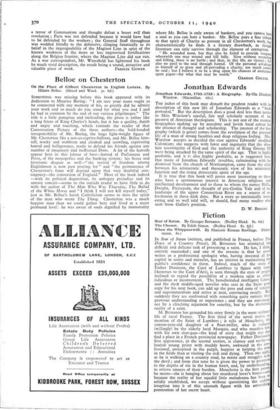Belloc on Chesterton
SOMETHING was missing before this book appeared with its dedication to Maurice Baring : " I am sure your name ought to be connected with any memory of his, so greatly did he admire your work and so much do you stand for what you and I and he had in common by the end of our various pilgrimages." The title is a little pompous and misleading, the prose is rather like a long frieze of King Charles's heads, but it has a quality, dumb and angry and touching, which reminds the reader of that Conversation Picture of the three authors—the bald-headed irresponsibility of Mr. Baring, the huge light-weight figure of Mr. Chesterton like a not-so-captive-balloon, and Mr. Belloc him- self, stocky and stubborn and cloaked and scowling, expressing hatred and belligerency, ready to defend his friends against any number of imaginary and ineffectual Dons. A lot of the hatreds appear here in this labour of love—hatred of Parliament and Press, of the monopolies and the banking system: his fierce and histrionic despair as well—" the revival of freedom among Englishmen is now past praying for " and " the permanence of Chesterton's fame will depend upon that very doubtful con- tingency—the conversion of England." Most of the book indeed —with its political dogmatism, its unhappy prejudice and its uneasy conceit—seems to the outside reader to have little to do with the author of The Man Who Was Thursday, The Ballad of the White Horse and "I think I will not kill myself today," just as Mr. Belloc's harsh Catholicism seems to miss the spirit of the man who wrote The Thing. Chesterton was a much happier man than we could gather here and lived at a more profound level: he was aware of souls dignified by immortality where Mr. Belloc is only aware of bankers, and you cannot hate a soul as you can hate a banker. 'Mr. Belloc pays a fine tribute to that spirit of Charity so present in all Chesterton's work, but characteristically he finds it a literary drawback, as though literature can only survive through the element of corruption.
" He wounded none, but thus also he failed to provide weapons wherewith one may wound and kill folly. Now without wounding and killing, there is no battle ; and thus, in this life, no victory ; but also no peril to the soul through hatred. Of the personal advantage to himself of so great and all-pervading a charity, too much cannot be said ; but I believe it to be a drag upon his chances of endurance upon paper—for what that may be worth."
GRAHAM GREENE.


























 Previous page
Previous page